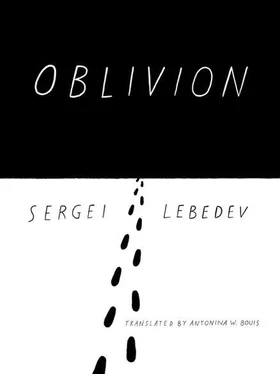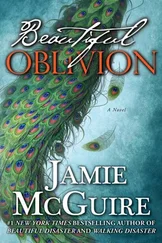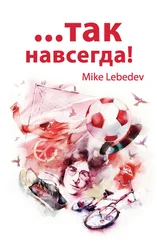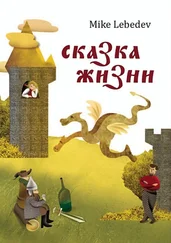I recognized the boat from the mosaics on the vault near Grandfather II’s grave, the long shadows of poplars that seemed to have fallen once and for all and could not get any longer; but there Charon transported a shade wrapped in a long shroud, while here the ferryman or fisherman was alone.
The near bank was still illuminated, molten in the sunset, while the far bank was hidden by the dark, and it was where the rower was headed; a deep ravine bisected the darkened bank, and a tongue of blackness fell from it into the river.
The train rushed ahead and its speed made everything outside seem slow; the rower could not turn, the wind could not ruffle the water, the ray of light could not chase away the dark, and we moved to the dark bank, and we moved through the foggy water meadows, where everything was as velvety as a bat’s wing, silent and immobile; people in the last cars could still see the river, the rowboat, the light, but the head of the train had plunged into twilight, into the winged silence of birds circling above the meadows; a few oxbows shimmered, giving off the heat of the day, and it was only these rising mists that showed that this light was still here, that the cold of night was not eternal here.
Sensing night, the flowers by the window began folding up their petals; the scent also fell asleep, its discharge ended; the glow of the river, the dark spot of the boat and rower, and the long shadows of the trees remained only in my eyes until I fell asleep. Wherever I looked, everything was blocked by the golden river and the movement of the oars, the world moved into the background, something you remember only through another memory and which moves away like the shore for someone on a boat; and through the water’s glow I could see my former life, suddenly very distant and less palpable than the funnels left by the oars on the smoky volcanic glass of the water.
I got off the train early in the morning, dark with rain; the passengers—and there were quite a few—vanished with amazing deftness. They were just there, coughing, grunting, swearing, with clumsy travel gear, boxes, backpacks, bags, carts, always more than there was room for, traveling hard, in stress, spitting every minute, working their muscles and elbows; they were just getting red in the face, bending over, carrying, dragging, pushing things somewhere, and suddenly there was no one, just a few taxi drivers without passengers smoking by their cars and watching dogs snarl in the empty lot near the station.
I went into the station. Sitting at a table in the café were two policemen and two guys in leather jackets; all four were the same. People who start growing quickly at the age of thirteen or fourteen have faces like that: physical grace cannot keep up with growing muscles and for a year or two the teenager turns into a lout. Their faces still had that expression of adolescent dullness—as if each of them, because of an excess of flesh, felt only with his stomach and penis; the table was covered with plates of shashlik and fried potatoes and a bottle of vodka, the waitress watched from the doorway.
The four sat like gatekeepers of the world I was entering; the waiting room stank of belching, of sour saliva dripping from a snoozing drunk, and then of smoke; people accustomed to sleeping rough—on the floor, on trunks, on the luggage rack of a train car, on dormitory cots, on plank beds in holding cells—lay on the benches, heads covered; everyone was bent over and rolled up for warmth, but it seemed they wanted to look as if they had already been hit, no need to hit them anymore. I knew how to sleep like that—sensing not my heart but my wallet in my sleep; I had slept in worse places, but here, walking through the station, I was still off the train , where you’re a passenger and think you have some rights—and for the four men at the table I was also a passenger : criminal slang is precise in its aphoristic scorn for those who think they are going somewhere and not being taken there.
The bus to town had already left or had not yet come. By the bus stop, painted tires were used for flower beds; I had laid out similar ones on “volunteer Saturdays” in school. I recognized the familiar poverty, the second life of things that substitute for needed objects; flowerbeds made out of tires or upside-down bottles dug into the ground, a feeding bowl out of a cardboard milk packet, ashtrays out of food tins. Born and bred among them, I now wondered: Does that happen only with things? What if my feelings and thoughts are also a forced substitution for something real? What if my love isn’t love at all, but another flower bed of tires with spittle-covered marigolds?
A car pulled up to the bus stop; a black Volga with an antenna—someone’s driver was making money in the morning. The door opened; the inside of the Volga was like a den: slipcovers of dark, fuzzy, fake fur, tinted windows, everything slightly worn, slightly unclean, smelling stale from the heater; the driver was like that, too—in a wooly vest that left his elbows bare, corduroy trousers, fat, with gold teeth, unshaven, with squinty eyes in the rearview mirror, clearly just barely awake but quick, the kind of guy who likes juggling—flicking a cigarette out of a pack and catching it in his mouth—thinking that was cool; these kind usually become taxi drivers rather than personal chauffeurs, they huddle together meeting trains in small towns, but you think twice before getting into the car. A taxi like that doesn’t drive you, it takes you away, and even a familiar road seems slightly unfamiliar; the driver gives off a sense not of danger but of unease—maybe he ran down someone on a rainy night and drove away, maybe he robbed a drunk passenger, maybe he’s selling something—and the money he gives you in change will always be ancient, greasy, wrinkled as if it never had a chance to lie in a wallet but kept making the rounds, over and over, folded, crumpled and greedily stuffed into a pocket. The bills—one torn, the second with a drop of blood, the third with some numbers written on it—will also smell of something pathetically forbidden, drunken conspiracies, hangover disputes, called-in debts, the worn oilcloth on a store counter spotted with herring brine; and you will imagine that for half the trip the driver kept deciding whether to drive you where you needed to go or to turn off into an alley or lonely spot you don’t know, tell you he has a flat, and see what you do …
The Volga flew up onto the railroad bridge—rail cars, cisterns, floodlights, squat cargo cranes flashed by—and raced down the potholed streets of the city. We had to press ahead, go some thirty kilometers, and arrive in another city, the one in the letter to Grandfather II; this town was low, the farther one arose in the distance with the smokestacks of a mining plant and beyond them gray sloping mounds enveloped in smoke and cumulus clouds.
The forest tundra began outside the city, but there wasn’t a single green tree there, only cliffs, stone rubble, and dead tree trunks; the prevailing wind was from the direction of the mining plant, and the smoke from the stacks precipitating with fog and rain had burned and killed every living thing over the decades. There should be no life in these places and they should not be seen—their picture has nothing to do even with the sight of natural catastrophes: just as a criminologist can tell murder from suicide, you can see murder, whether direct or indirect, in landscapes mutilated by humans, you can tell because in nature death is swift and not ugly, while murder done by people is marked by protracted deformity.
Then came warehouses, fences, fences, fences; in the distance there were mountains, night sky, and unfettered expanses, while here everything was fenced, separated by walls; barbed wire covered everything. There were barriers everywhere, warning signs, “no entry” symbols, guard booths and outside them, strays who rushed to bark at the car. Then suddenly, like an abyss, came an empty lot retaining only the start of work—here they excavated a hole, there they abandoned a pipe, there they set up strips of wood to mark out something or other; the lot was as dark as the dirt and you could dig into the darkness with a shovel. The car flew on, and once again there were fences, floodlights, workshops, pipes, smoke, steam, and light—and then another plunge into emptiness. Man defended himself, barricaded himself, he was not master of these lands, and the guard booths were the architectural descendants of prison camp guardhouses; this land was infected with a fungus , the fungus of the watchman, and all of this, the fences, wire, barricades, was like a single never-ending shout: “Stop or I’ll shoot!”
Читать дальше












